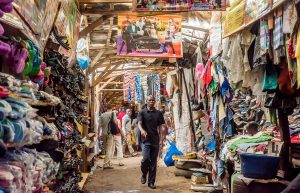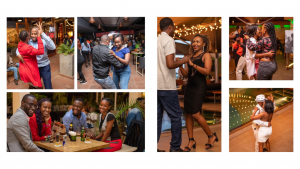Is Nairobi safe? As a lifelong Nairobian, I Would Say: yes, absolutely.
Compared to other African cities, Nairobi is far safer. But against some European and American cities, maybe less so. Kenya’s capital is not perfect. In fact, Nairobians have nicknamed the city Nairobery, on account of how common petty theft and pickpocketing are in certain areas.
That said, it’s perfectly normal to be concerned about your safety. To help you, I’ve come up with some essential information and tips on safety in Nairobi.
Quick Tips
You can do plenty of things to both stay safe while traveling or living in Nairobi.
Avoid walking around alone at night. Unfortunately, not many places in Nairobi are well lit or secure for you to be out and about at night. If you’re going somewhere in the evening, have someone you trust drive you or use a ride-hailing app like Uber and Bolt.
Avoid Nairobi CBD at night. There’s plenty to see at the CBD but stick to exploring it during the day.
Always keep your phone and wallet secure. And if you’re out walking, don’t use your phone or headphones if you don’t have to.
If you’re attending a crowded event, bring a cheap ‘burner’ phone you don’t mind losing to pickpockets. A lot of the time, pickpockets remove wallets and phones from your backpack’s front compartment. Carry your bag in front of you and put your wallet in your front pocket.
Use ride-hailing apps like Uber and Bolt to get around. They are the safest ways to move around in the city. Whenever you’re using your phone in a car, keep your window three-quarters of the way up or closed – especially when going through the CBD and other busy streets. Thieves have been known to snatch valuables through the windows of moving cars.
Keep up to date with local politics in case of protests or unrest. Do some research ahead of your visit. And while in Nairobi, stay informed. Register with your local embassy to receive text updates and alerts.
Terrorism in Nairobi
In the past 20 years, Kenya has been hit by several terror attacks.
But when it comes to safety in Nairobi, there is no denying that news coverage influences how people outside the country perceive the city. Sadly, international news is almost always filled with stories of tragedy and chaos in African cities, Nairobi included. Such coverage has played a massive role in shaping negative perceptions about Nairobi.
This is not to say that there haven’t been tragedies in Nairobi. The most recent terror attack was in 2019 when Al-Shabab attacked an office complex and adjoining Dusit Hotel in Nairobi.
The reporting of this incident drew a lot of outrage. For example, the New York Times was accused of being disrespectful and dehumanising after printing gruesome images of the dead and injured.
In 2015, when US former president Barack Obama visited Nairobi, CNN carried a story on the security threats the president was exposed to, terming Kenya a hotbed of terror. This led many to criticize the news network for negatively profiling the country.
This type of coverage, in addition to only focusing on news that centers on terrorism and crime in Nairobi, adds to fears and anxieties about Nairobi. But, as I had earlier mentioned, there are fewer incidences of terror attacks in Nairobi compared to Europe.
There’s a gap in positive news coverage of Nairobi and the security measures put in place taken since the attack in 2019. You’ll be happy to know that cars, luggage, and people are now searched and go through metal detectors on the way into malls and buildings. This has significantly improved security.
Additionally, the EU and the USA will issue travel advisories when they suspect possible terror attacks. Check their websites regularly.
Safety for Women
Like in many parts of the world, women face challenges in ensuring their safety when travelling or moving to a new city. In addition to the tips on safety in Nairobi above, here are a couple more for the women.
Avoid going out for drinks alone. It’s frustrating, especially if you want to experience Nairobi’s nightlife. But it’s essential to have a trusted company when you’re out in bars and clubs.
Nairobi is a modern place, and most residents have a liberal attitude towards women. But you may experience some catcalling and unwanted attention, especially in the CBD. Avoid engaging. You can say hello back but keep moving.
Understand the city’s culture. While Nairobi is an urban city, local customs and dress codes remain mostly conservative. The general rule is to wear conservative clothing. Pack long, loose-fitting clothes that cover your shoulders, knees, midriff, chest, and back.
LGBTQ+ Safety
Kenya’s government does not recognise any relationships between persons of the same sex, and under the Kenyan constitution, same-sex marriage is banned.
Kenya is considered among the most progressive African countries. But in 2019, the country’s High Court upheld a law that punishes homosexual acts with up to 14 years in prison. This hasn’t changed since. However, it’s rarely enforced.
The subject of LGBTQ+ and their rights is considered taboo. Unfortunately, the safety of people who identify as such isn’t always guaranteed.
Despite this and the law, Nairobi is increasingly tolerant. For the most part, no one will bother you about your sexuality. Your identity your business, and you don’t have to tell anyone how you identify if you don’t want to.
However, you might experience difficulties if your behaviour is deemed inappropriate. But this applies to heterosexual couples as well. So, if you are a same-sex couple, avoid public displays of affection.
Safety at Night
When it comes to nighttime in Nairobi, the same safety tips apply as during the day, but there are a few more to consider.
If you’re going out, use a ride-hailing app like Uber. Avoid going out alone, and when you do go, don’t carry around a big purse or backpack as they can be targets for petty theft.
Avoid the CBD at night. Bars and clubs in Westlands, Kilimani, Gigiri, and Runda are safer options if you’re looking to enjoy some nightlife.
Avoid leaving your drinks unattended when you go out and don’t accept opened drinks from strangers.
Road Safety and Traffic
Expect a lot of traffic in Nairobi, especially during rush hour. If you have errands in the CBD, ensure you complete them before 4-5pm, when many people leave work.
Public transportation in Nairobi includes buses called matatus and motorbikes called bodaboda. They are both an affordable way to get around. However, buses tend to be too crowded. This is also where pickpockets can take advantage, especially if you are not careful.
The buses all look different as they go to different parts of the city. It takes time to get used to them. If you must take a bus, stay vigilant and aware of your belongings. Uber and Bolt are the better and safer alternatives.
Bodabodas are fast and efficient, but many of them flout traffic rules and can put you in danger. The best options for bodabodas are those ordered through Uber or Bolt.
Very few areas in Nairobi have designated bike lanes. Most cyclists share the main road with cars. If you are a cyclist, ensure you have protective gear and wear a reflective jacket.
For more information, check out our guide to cycling in Nairobi.
Getting Around Safely
It’s important to know where you’re going when getting around the city. Do your research about where you’re going and always have an idea of where you are. It helps if you have online maps.
Only walk around during the day. Confidence is key. If you are nervous, you may attract unnecessary attention.
Areas to Avoid
Take some time as soon as you arrive or even before to get to know any areas in Nairobi you may want to avoid or not want to visit at specific times.
As I had mentioned, avoid the CBD at night. Areas and streets in town with a reputation for being unsafe and for crime in Nairobi include:
- Kenya National Archives
- KenCom Bus Station
- River Road street
- Kimathi Street
- Ngara
Neighbourhoods to avoid late in the evening include:
- Makadara
- Embakasi
- Kamkunji
- Githurai
Kibera is one of the biggest slums in Africa and attracts visitors and tourists. Only go with a trusted tour guide and only during the day.
Some events and concerts in Nairobi attract petty thieves. If you’re not careful, you may lose your phone and wallet. These include events and concerts held at Ngong Racecourse and the KICC. You should always research about them and get information about the sizes of the crowds and if the events are well planned and safe.
Protests and Civil Unrest
Protests frequently occur in Nairobi. Most are usually political and mostly happen within the city center. Often they turn violent. During these times, avoid going to the city center. If you are caught up in a protest, find a safe venue to wait it out.
Election protests are the most common in Kenya. The most violent protest was in 2007 when violence broke out after the presidential election. However, elections have been relatively peaceful since then. It is common to feel slightly uneasy during the election season, given the country’s violent past.
If you are planning a visit, I recommend visiting weeks before or after the election. If you are a resident, ensure you are registered with your embassy. They always give directives and plans for flights out of the country if they deem it necessary.
Common Scams in Nairobi
Some of the most common scams that affect your safety in Nairobi include people stopping you on the road to ask a question or ask for help only to rob you. Avoid engaging.
You should also be aware of online scams. For example, buying goods online, especially from Facebook or Instagram, isn’t always advisable. Do some research to ensure the seller is legit.
Scammers will sometimes call you claiming to be from your network provider or bank to “verify” some personal information. Never give out personal details like PINs and account numbers.
Safety on Safari
When you’re in Nairobi, it’s more than likely you’ll go on a safari. Kenya has a well-established tourism sector, and visitors and tourists are well looked after. Tour companies will only take you to places considered safe.
While on safari, your guides will always ensure your safety. All you must do is follow their instructions and always keep your distance from wild animals. It is, however, important to also follow basic safety precautions on your safari.
Most hotels and lodges have proper security measures in place. Many hire armed guards and will have electric fences around their properties. As I had mentioned earlier, cars, people, and luggage are checked and go through metal detectors.
Cybercrime in Kenya
Cybercrime is a massive issue in Kenya – and it’s getting worse.
The National Kenya Computer Incident Response Team (CIRT) detected a 100% increase in cyber attacks from 2017 to 2019, from 23 million attacks annually to over 51 million.
In 2020, the Coronavirus pandemic created huge opportunities for hackers and cybercriminals. More people started working remotely, e-commerce grew in popularity, and confusion about the pandemic made fraud easier than ever. As a result, cyber attacks increased 150% from July to September 2020.
In 2021, as trends towards more remote working and e-commerce continue, we can expect cybercrime to increase in step.
While a VPN won’t provide 100% security from cybercriminals, it makes a huge difference. By hiding your data, identity, online activity, and browsing history, a VPN makes it harder for cybercriminals and hackers to find you. It also restricts the amount of information you release onto the web and keeps you safe when using unprotected or vulnerable networks (i.e., restaurants and public wifi networks).
By investing a few hundred bob every month in a VPN, you significantly reduce the risk of getting scammed or hacked while online. But a VPN is just the first step. Take time to learn about data privacy and cybercrime, so you know how to avoid the worst dangers online.
The Bottom Line
Finally, the most important thing to remember is that crime in Nairobi is often opportunistic. You might be a little nervous or anxious about your safety in Nairobi, but making yourself less of a target by adopting an air of confidence, blending in, and being aware of your surroundings will go a long way to keeping you safe.
Most people who live in or visit Nairobi do so without any issues.
There is so much more than can be said about safety in Nairobi. If I’ve left out any important tips or information, please add them to the comments below.








4 thoughts on “Is Nairobi Safe? Tips for Residents and Tourists”
Dear Zeddy Kosgei,
I am a citizen of Denmark, and would like to know whether a Covid-19 vaccination certificate is mandatory for entering Kenya, or if it is sufficient with a Covid-19 PCR test for entering Kenya?
Happy New Year.
With Kind Regards,
Emil.
Hey Emil,
Currently, as of January 2022, you need both a vaccine cert and negative PCR test to enter Kenya. Hope that’s helpful.
What VPN provider for phones would you suggest?
Thank you,
Amelia Mendus
Kansas City, Missouri, USA
Hi Amelia, I recommend ExpressVPN. I use it every day in Kenya.